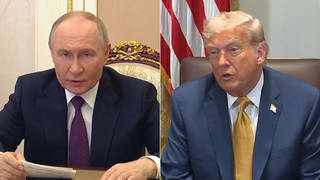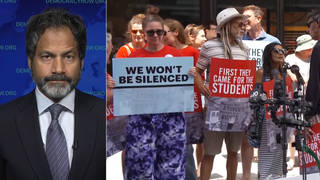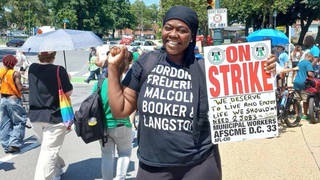
Guests
- Stephen Cohenprofessor of Russian studies at New York University and author of numerous books on Russia and the Soviet Union. His most recent book, Soviet Fates and Lost Alternatives: From Stalinism to the New Cold War, is just out in paperback.
Thousands of people took to the streets of Moscow on Monday protesting alleged fraud in Vladimir Putin’s return to the presidency. An estimated 500 were arrested in parallel rallies in Moscow and St. Petersburg after initial results gave Putin a 63 percent victory in Sunday’s vote. Putin previously served as Russia’s president from 2000 to 2008. Monday’s protests followed a number of similar rallies against Putin. We look at the state of Russian politics and the motivations behind the protest movement. “The opposition [has] turned, actually, the protests from a demand for clean government, democracy and an end to corruption to simply 'Putin must go,'” says Stephen Cohen, professor of Russian studies at New York University. “It would be a bad thing because, in effect, it’s saying, let us destabilize the Russian government.” [includes rush transcript]
Transcript
AMY GOODMAN: We turn now to Russia, where thousands took to the streets Monday protesting the alleged fraud in Vladimir Putin’s return to the presidency. An estimated 500 or 600 people were arrested in rallies in Moscow and St. Petersburg after initial results gave Putin a 63 percent victory in Sunday’s vote. Putin previously served as Russia’s president from 2000 to 2008. The Organization for Security and Co-operation in Europe says there have been widespread claims of fraud and vote violations. Monday’s protests followed a number of similar rallies against Putin, who also faced widespread allegations of fraud after his United Russia party won a majority in the lower house of parliament late last year. Putin also drew crowds of supporters in Moscow with thousands gathering to celebrate his victory.
For more on Russia, we’re joined by Stephen Cohen, professor of Russian studies at New York University, author of numerous books. His latest is called Soviet Fates and Lost Alternatives: From Stalinism to the New Cold War.
Welcome back, Professor.
STEPHEN COHEN: Thank you, Amy. Thank you.
AMY GOODMAN: Professor Cohen, explain what happened. Has Putin won legitimately the presidency of Russia?
STEPHEN COHEN: I don’t know what the word “legitimately” means. I know people who think that the second President Bush didn’t become president legitimately after Florida. The opposition, the hardcore opposition in the streets, is going to ride this legitimacy issue, because there’s absolutely no doubt that Putin did get over 60 percent of the vote. It wasn’t fair. He had all the state’s resources. The other candidates didn’t get much air time. But he’s popular in Russia, and he’s 60 percent-plus popular. Is that legitimacy?
The opposition wants to argue that—and they’ve turned, actually, the protests from a demand for clean government, democracy and an end to corruption to simply “Putin must go.” But would that be democratic if they forced Putin out of office? But it is a new issue in Russian politics, the legitimacy of the government, and this idea that making the Russian government illegitimate somehow, either in the eyes of its own people or in the eyes of the West, would be a good thing. I think it would be a bad thing, because, in effect, it’s saying, let us destabilize the Russian government. And nobody asks what that would mean for us or for Russian.
AMY GOODMAN: Explain—what’s the difference between the prime minister and the president in Russia? What does this mean for him to return to the presidency after being prime minister?
STEPHEN COHEN: Constitutionally, this is a president-heavy constitution. It was imposed on the country in 1993 by Yeltsin after he used tanks against the parliament. That was a lost opportunity, because in the whole of Russian history, Russia has had lots of autocratic leaders. It’s never had an independent, sustained parliament. And obviously, if you want representative government, no matter what country you’re in, you have to have a parliament, a congress, a representative one. The constitution Yeltsin imposed on the country gave most of the power vis-à-vis the parliament to the president. Putin rigged it—or, I wouldn’t say he rigged it, but he found powers within the prime ministership so that when he couldn’t succeed himself after two terms and he went to the prime ministership for four years, he remained the supreme leader in the country. But the power is in the Kremlin, most symbolically, traditionally and constitutionally.
AMY GOODMAN: Who are the protesters? Who’s the opposition?
STEPHEN COHEN: That’s a crucial question. Now, what we got in the United States is a media narrative that says the opposition are the people in the streets. But the established opposition are the parties in parliament, the non-Kremlin parties. And of those parties, it’s the Communist Party. You had me as a guest in December after the parliamentary elections, when the Communists doubled their vote, from 10 percent of the parliamentary vote to 20. The Communist Party, whether we like it or not in this country, remains the only nationwide opposition party. It’s the only one that we would recognize as a real electoral party. The other parties are fragmentary parties with support in Moscow or in a few cities, but they’re not national opposition. So, by conventional standards, the opposition is the Communist Party, the main opposition.
But something new is happening in Russia. And I mean, last night I watched Russian television, 45 minutes, state television news, state—9:00 news. Of the 45 minutes, 30 minutes were spent showing protests around Moscow, and all manner of protests—anti-Putin, pro-Putin, anti-pro-Putin, anti-anti-Putin, counter, pro—this is a good thing, if it doesn’t get out of control. This is a new kind of politic. So, arguably, there is a moment here where the opposition could be non-parliamentary. But whether that’s a good thing, if you want democracy, or not, I’m not sure, because democracy is usually something institutionalized.
AMY GOODMAN: And what side does the U.S. play in this? Does it have any role?
STEPHEN COHEN: Well, now—you see, here’s the problem. Most of your listeners and viewers probably, on a sentimental level, think that democracy promotion is a good thing, that we should promote democracy. In Russia, it’s been only a bad thing. It began, of course, during the Cold War, but it became intrusive after the Soviet Union ended in the 1990s, when the Clinton administration literally sent legions of democracy promoters to Russia to teach them how to do democracy. And it’s had only bad results. My only—own view is, is that we should step aside, that the American ambassador should not be meeting with the leaders of the street protesters the day after he arrives.
AMY GOODMAN: Is that what he did?
STEPHEN COHEN: He did. And President—Vice President Biden went to Russia last year and tried to persuade Putin not to return to the presidency. In a crude way, it’s none of our business. But there’s a more fundamental issue here. We, I mean, the United States, even the smartest of Americans who spend their time studying this, don’t have the wisdom to intervene so deeply. There’s nothing more complicated, delicate, fragile and produced by history as democracy. It takes time. We don’t know Russia well enough to intervene in that way. And we’ve done only harm, I think. And, of course, it feeds into Putin, who claims that these people in the streets are getting money from the United States.
AMY GOODMAN: How is Putin going to deal with the protests?
STEPHEN COHEN: Well, here’s where I think we’re at at the moment, and this is the issue that’s not being focused on in the Western press. Russia has a long history of lost opportunities to move toward stable democracy—two or three in our own lifetime. This, I think, is a very unusual moment. There are a lot of pluses going on, because the Kremlin has changed its mind about political reform, because the middle class has come into the political arena. There are possibilities for real democratic reform at the moment.
There’s two questions: Will the maximalist—I don’t want to call him “extremist,” but the maximalist—in the streets push for a confrontation with the government? And it indicates—it suggests that some of them will by what happened yesterday. As in any system, you’ve got to get a permit to protest. And they say, “OK, you can have this area, and you can stay two or three hours. Then it’s not legal.” They are testing this now. Last night they were given a permit in the center of Moscow from 7:00 to 9:00. They refused to leave at 9:00, so the police came in and took them away. It’s part of a game. And the Western media knew it was going to happen. Is that a good thing to do? That’s the question.
AMY GOODMAN: We only have a minute to go, and I wanted to ask you about Russia’s role in Syria—
STEPHEN COHEN: Yeah, yeah.
AMY GOODMAN: —in blocking at the United Nations.
STEPHEN COHEN: Right. Well, you know, we say the Russians are abetting massacre in Syria. The Russians say that we betrayed them on the resolution on Libya, that they voted—or they stood us—they didn’t veto the no-fly zone over Libya, because we promised we wouldn’t use it for war, and we did. So they say, never again. And that’s where we’re at now.
AMY GOODMAN: And will Putin continue that line?
STEPHEN COHEN: They have access in Syria. I think it’s incumbent upon them, if they’re not going to—the Russians—if they’re not going to support a U.N. action, to use their good offices in Syria to do something positive. And they’ve got their diplomats there now, and we’ll see.
AMY GOODMAN: Professor Cohen, I want to thank you for being with us. Professor Cohen is profession of Russian studies at New York University, author of numerous books. His latest book is called Soviet Fates and Lost Alternatives: From Stalinsim to the New Cold War; it’s just out in paperback.













Media Options